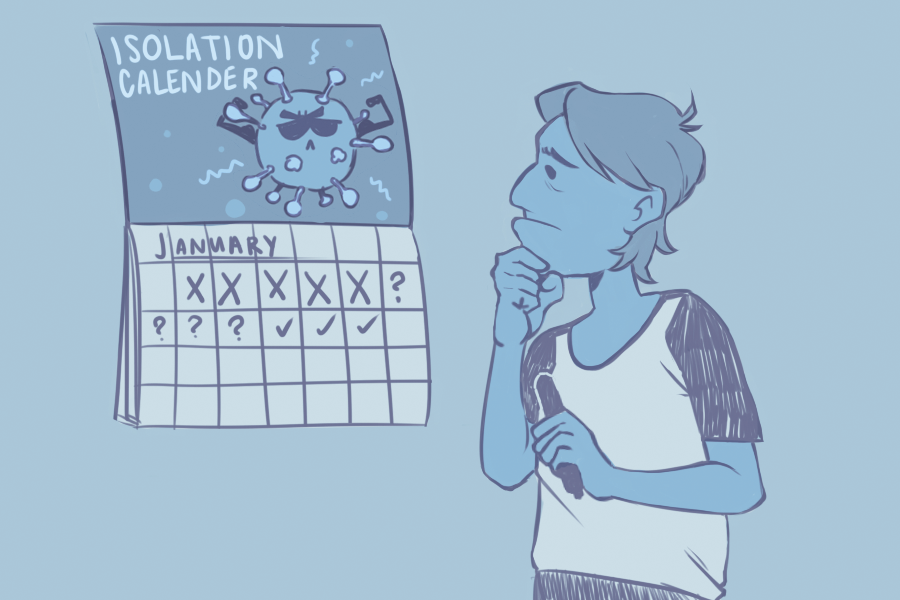Given research suggesting that the coronavirus is most highly transmissible for seven days after contraction, UTD should adopt a seven-day isolation period as the new norm.
The FAQ section on the Comets United webpage says contact tracers will determine isolation timelines based on CDC guidelines – which recommend five days of isolation for individuals in most cases – and certain Comets might be inclined to follow the 10 – 14 day isolation period from last semester. However, neither are optimal isolation periods.
A study published in the journal Annals of Internal Medicine showed the COVID-19 virus is most contagious right before and seven days after symptoms arise and transmission dies down after day seven, remaining insignificantly different from after then to after day 14. Peer-reviewed research published in The Lancet echoed these findings, and the CDC themselves – the leading health institute covering COVID-19 – analyzed 113 studies from 17 countries and found the general census is that coronavirus is at its most infectious for up to a week after symptoms arise. The studies include data on the highly infectious omicron variant, which is more contagious than other variants, but not contagious as long . So, with seven days as the threshold for transmission, seven days of isolation is sound – the CDC’s five-day isolation recommendation is too risky and 10 – 14 days is arbitrary.
Although UTD has used CDC guidelines to help shape nearly all of their other pandemic policies, they should consider that the CDC’s reasoning for their five-day recommendation is contradictory and cryptic, and thus they shouldn’t follow it blindly. As mentioned earlier, the CDC acknowledges studies from a plethora of other research institutions that show the COVID-19 virus is most transmissible for a week after symptoms arise, yet they say on their website they recommend isolating for five days because that’s how long the coronavirus is most infectious for, which doesn’t add up. They vaguely mention mental health and the economy as influencing their decision, but these reasons aren’t safety-driven, and neither of them play a role in how long students are supposed to isolate for when infected with other viral illnesses – such as the flu – so why are they relevant here? To be fair, the CDC does recommend individuals wear masks for five days after isolating, but because UTD can’t mandate masks, there isn’t a way to ensure Comets wear masks on campus for days five-to-seven of infectiousness. Ultimately, the CDC’s isolation guidelines are unsafe, and UTD (rightly) seems to be keen on keeping Comets safe from COVID-19; it’s why classes are online until Feb. 4, why the first third of last semester was re-densified, and why the University is still implementing contact tracing and the Daily Health Check. So, even if the CDC is an information leader on COVID-19, “the CDC says so” shouldn’t be the sole reason isolation times are shortened to less than what’s best.
Conversely, students who are assigned a shorter isolation period shouldn’t follow last semester’s 10 – 14 day isolation policy “just in case.” Not only is isolating for more than seven days evidently unnecessary, but it’s harmful to students academically. Missing class while contagious is both unfortunate and essential – taking care of your and your community’s health is of utmost importance – but quarantining past the necessary isolation period can take an additional toll on students’ academic performance. While students quarantining for longer may be able to get assistance from their professors remotely and participate in class virtually, they’ll still be at a disadvantage not learning material in the way it was meant to be taught; moreover, skipping class beyond the officially-mandated timeframe may be considered truancy by professors taking attendance.
The Comet Task Force should lengthen isolation guidelines to seven days and update the Comets United page to clearly communicate that as soon as possible, while the semester is still early. And being diligent, the University should also require that isolated Comets get tested for COVID-19 before their isolation period ends and recommend they keep an eye out for worsening or returning symptoms to determine if they need to quarantine for longer. In the meantime, students should continue reporting symptoms or positive tests if they contract COVID-19, and until the University updates their policies, abide by the timeline that is recommended by contract tracers.






